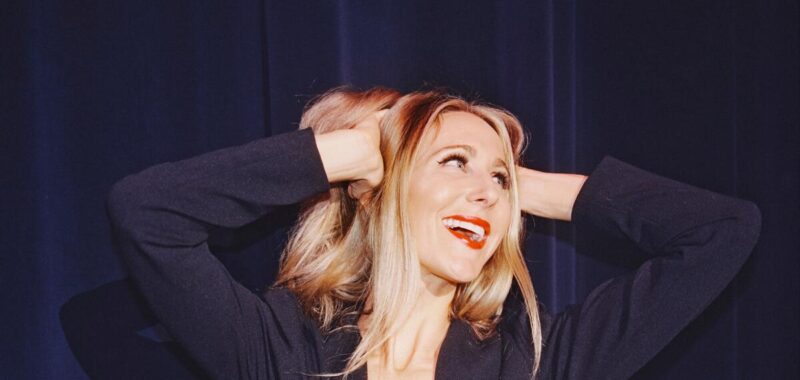In Nikki Glaser’s Emmy-nominated HBO stand-up comedy special, “Someday You’ll Die,” she explains that she’s been suffering from postpartum depression: “My friend just had a baby, and I’ve been mourning the loss of that friendship.” She talks about the time she got an Easy-Bake Oven as a child: “I stuck my head in it.” She details her specific tastes in porn and her boyfriend’s willingness to bring them to life. For one hour, she works dark and blue, tapping into a personal vein of comedy that leaves her vulnerability bare.
Glaser, nominated for best variety special, is embracing what might be described as her arrival at peak comedy truth-telling. Her recent work has an implicit message: This is who I am. Deal with it.
“If I gave a f—, it would mean that I have some kind of shame around the things I think,” she said in a recent video interview from her home in St. Louis. “I did a lot of work internally to be like, ‘OK, there’s really nothing wrong with what I’m saying.’ I don’t want kids. I don’t understand why people have them. I do sometimes have suicidal thoughts, and that doesn’t make me a bad person. And it doesn’t make me bad to say that I have ’em.”
In May, the same month that “Someday You’ll Die” premiered, Glaser sent a roomful of comedy colleagues and professional athletes into stitches with her set at Netflix’s “Roast of Tom Brady,” in which she flame-broiled everyone from the legendary NFL quarterback to comedian and host Kevin Hart. It was about as funny and fearless as such a routine can get, earning a rare roast standing ovation.
In the midst of a 20-year career, Glaser, 40, suddenly finds herself the hottest name in comedy. A veteran of clubs, stand-up specials and TV series (“FBoy Island,” “Inside Amy Schumer”), she’s not an overnight success story. And she approaches the new fame with the internal self-deprecation and insecurity that fuels so many funny people.
“I suffer from really bad impostor syndrome, so I’m always fine with being ignored for what I feel like I deserve deep down anyway,” she said. “I liked being recognizable, but in a way that people think maybe they went to camp with you or something. They couldn’t really place where they knew you from.”
As the title suggests, “Someday You’ll Die” comes from a perspective of knowing time catches up with everyone. Glaser goes into detail about what age has done to her body. She doesn’t shirk from the fact that she doesn’t want to be a mom (“My fertility is disappearing, but I wanted it to,” she said in the interview. It’s a pretty good bet JD Vance isn’t a big Nikki Glaser fan). She shares anxieties about becoming less desirable.
And she does it all with disarming good cheer and disregard for propriety. Glaser is not a clean, observational comedian. She is delightfully, profanely confessional, threading the needle between brutal honesty and self-indulgence.
She is also upfront about her battles with depression and suicidal thoughts. Depression can strip away the illusions people carry about themselves and others, and when that happens, humor, paradoxically, can run wild. Glaser’s comedy suggests that she has already thought about anything painful you might have to say about her. Comedy, like the blues, often springs from the conversion of pain into a purity of expression. Glaser has become a master of this alchemy.
“Comedy, at its best, is relatable because we all have to die someday,” Glaser said. “We’re all terrified of it. And depression comes from not really thinking about it and suppressing it in our subconscious. I was really trying to hide it for a while. I thought it made me a liability in this business — no one wants to work with someone depressed. But the business doesn’t care. They’re not worried about me killing myself. As long as I’m getting laughs with it, it’s going to be OK.”
She’s also trying to take care of herself. Glaser quit drinking in 2011, and she moved back to her hometown of St. Louis in 2020, taking a step away from the bright lights and temptations of Los Angeles and New York. She still loves to tour, but she’s also learning to live without a microphone in front of her. “I travel for the work that really matters,” she said. “When I’m on the coasts, I say yes to everything and I do a bunch of sets, but I don’t get anything done. I want to be intentional with my work, so I’ve got to take a Southwest flight to get to it.”
These days, when she gets to it, she kills it with a smile.

